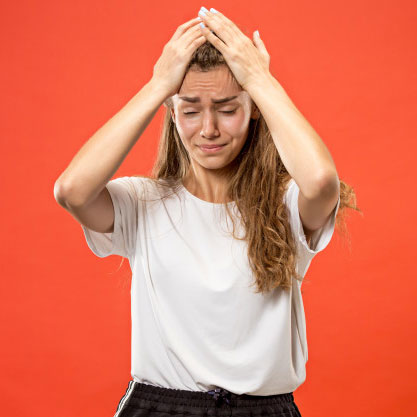I am stressed!
I am stressed!
Symptoms of stress
You may experience one or more of these symptoms if you’re under stress:
- Chronic pain
- Insomnia and other sleep problems
- Lower sex drive
- Digestive problems
- Difficulty concentrating and making decisions
- Fatigue
- Feeling overwhelmed, irritable, or fearful.
- Stress headaches due to tense muscles in the head, face, and neck may vary from mild to moderate dull head pain, a band of pressure around your forehead or tenderness of the scalp and forehead.
- Stomach ulcer.Physical stress may affect how you heal from an ulcer. In turn, the heartburn and pain of a stomach ulcer can lead to emotional stress.
- Stress eating – when you find yourself eating without thinking, binging in the middle of the night, or generally eating way morethan you used to.
- Stress at work can be occasional or chronic and can come in the form of:
- feeling you lack power or control over what happens
- feeling stuck in a job you dislike and seeing no alternatives
- being made to do things you don’t think you should do
- experiencing a conflict with a co-worker
- having too much asked of you, or being overworked
- Stress and anxietyoften go hand in hand. Anxiety is when you feel high levels of worry, unease, or fear. Having both stress and anxiety can make you more likely to develop high blood pressure, heart disease, diabetes, panic disorder, depression, etc.

Tips For Managing Stress:
- Keep a positive attitude, give yourself positive messages (”I’m doing my best,” or ”I’ll ask for help”) instead of defaulting to negatives (”Nothing goes right for me,” or ”Bad things always happen to me”),
- Accept that there are events that you cannot control.
- Be assertive instead of aggressive. Assert your feelings, opinions, or beliefs instead of becoming angry, defensive, or passive.
- Halt stress in its tracks; if you feel overwhelmed, take a walk or drive in the slow lane to avoid getting angry at other drivers.
- Learn to manage your time more effectively. Give yourself time to get things done; set your watch. Staying on top of your to-do list can help ward off procrastination-related stress.
- Take 15-20 minutes every day to sit quietly and reflect. Practice relaxation techniques like deep breathing – it helps activate your parasympathetic nervous system, which controls the relaxation response.
- Regular exercise can help lower stress and anxiety by releasing endorphins and lowering your body’s stress hormones such as cortisol, improving your sleep quality and make you feel more competent and confident in your body, promoting mental wellbeing.
- Eat healthy, well-balanced meals.
- Set limits appropriately; say no to requests that would create excessive stress in your life. Try not to take on more than you can handle.
- Make time for hobbies and interests. Do things that are pleasurable, like reading or gardening.
- Get enough rest and sleep. Your body needs time to recover from stressful events.
- It’s good for your health, and it helps relieve stress by relieving your stress response and by relaxing your muscles. Find the humour in everyday life
- Don’t rely on alcohol, drugs, or compulsive behaviors to reduce stress. Drugs and alcohol can stress your body even more.
- Reduce your caffeine Intake. Caffeineis a stimulant found in coffee, tea, chocolate and energy drinks. High doses can increase anxiety.
- Write It Down. Keeping a journal can help relieve stress and anxiety; jotting down what you’re grateful for may help relieve stress and anxiety by focusing your thoughts on what’s positive in your life.
- According to several studies, chewing gum may help you relax. It may also promote wellbeing and reduce stress.
- Seek out social support. Having strong social ties may help you get through stressful times and lower your risk of anxiety.
- Several supplements promote reduction of stress and anxiety. Some common ones include: Lemon balm, Omega-3 fatty acids, Green tea (contains antioxidants, may lower stress and anxiety by increasing serotonin levels), Valerian root, Kava kava, etc. Some supplements can interact with medications or have side effects, so consult with a doctor if you have a medical condition.
- Aromatherapy: Only use 100% essential oil scented candles to help reduce your feelings of stress and anxiety. Some of the most calming scents are Lavender, Bergamot, Chamomile, Frankincense, Sandalwood, Rose, Ylang ylang, Orange, Geranium, etc.
- Positive physical contact from cuddling, hugging, kissing and sex may help lower stress by releasing oxytocin and lowering blood pressure
- Listening to soothing music, e.g. classical or nature sounds can be particularly relaxing.
- Interacting with pets may help release oxytocin, a brain chemical that promotes a positive mood and is a relaxing, enjoyable way to reduce stress.
- Seek treatment with a mental health professional trained in stress management or biofeedback techniques to learn more healthy ways of dealing with the stress in your life.
Trick your brain to effectively deal with stressful situations
To “trick” your brain’s response to pressure, use this “four-step brain hack to harness stress:
- Sayout loud “I feel excited”
- Breathe in slowlythrough the nose for five seconds and then exhale for six seconds.
- Stand up tall and puff out your chest like a superhero (This pose boosts testosterone levels in both men and woman.)
- Squeeze your right hand shutfor 45 seconds, open for 15 seconds and then shut it again. Squeezing the right hand increases activity in the left side of the brain.
By channeling stress into positive energy, the brain is “tricked” into dealing with “fight or flight” hormones, adrenaline and cortisol, before they can cause problems.
Sources:
https://www.webmd.com/anxiety-panic/guide/tips-for-reducing-stress
For guidance on changing bad habits, managing stress or any other needs, contact us with your specific request on info@agape4life.com

